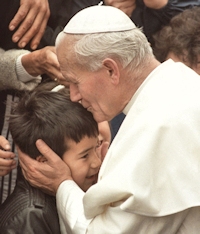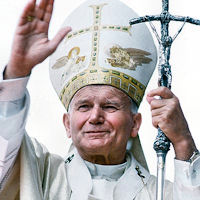Ordinary Time: October 22nd
Saturday of the Twenty-Ninth Week in Ordinary Time; Optional Memorial of St. John Paul II, Pope
» Enjoy our Liturgical Seasons series of e-books!
Today is the Optional Memorial of St. John Paul II (1920-2005). Karol Jozef Wojtyla was born in 1920 in Wadowice, Poland. After his ordination to the priesthood and theological studies in Rome, he returned to his homeland and resumed various pastoral and academic tasks. He became first auxiliary bishop and, in 1964, Archbishop of Krakow and took part in the Second Vatican Council. On October 16, 1978 he was elected pope and took the name John Paul II. His exceptional apostolic zeal, particularly for families, young people and the sick, led him to numerous pastoral visits throughout the world. Among the many fruits which he has left as a heritage to the Church are above all his rich Magisterium and the promulgation of the Catechism of the Catholic Church as well as the Code of Canon Law for the Latin Church and for the Eastern Churches. In Rome on April 2, 2005, the eve of the Second Sunday of Easter (or of Divine Mercy), he departed peacefully in the Lord.
On May 29, 2014, Pope Francis ordered the inscription of Saint John Paul II into the General Roman Calendar. St. John Paul is celebrated each year as an Optional Memorial on October 22.
St. John Paul II
Karol Jozef Wojtyla, elected Pope on October 16, 1978, was born in Wadowice, Poland, on May 18, 1920.
He was the third of three children born to Karol Wojtyla and Emilia Kaczorowska, who died in 1929. His elder brother Edmund, a physician, died in 1932, and his father, Karol, a non-commissioned officer in the army, died in 1941.
He was nine years old when he received his First Communion and eighteen when he received the Sacrament of Confirmation. After completing high school in Wadowice, he enrolled in the Jagellonian University of Krakow in 1938.
When the occupying Nazi forces closed the University in 1939, Karol worked (1940-1944) in a quarry and then in the Solvay chemical factory to earn a living and to avoid deportation to Germany.
Feeling called to the priesthood, he began his studies in 1942 in the clandestine major seminary of Krakow, directed by the Archbishop Adam Stefan Sapieha. During that time, he was one of the organizers of the "Rhapsodic Theatre", which was also clandestine.
After the war, Karol continued his studies in the major seminary, newly reopened, and in the school of theology at the Jagellonian University, until his priestly ordination in Krakow on November 1, 1946. Father Wojtyla was then sent by Cardinal Sapieha to Rome, where he attained a doctorate in theology (1948). He wrote his dissertation on faith as understood in the works of Saint John of the Cross. While a student in Rome, he spent his vacations exercising pastoral ministry among Polish emigrants in France, Belgium and Holland.
 In 1948, Father Wojtyla returned to Poland and was appointed a curate in the parish church of Niegowi?, near Krakow, and later at Saint Florian in the city. He was a university chaplain until 1951, when he again undertook studies in philosophy and theology. In 1953, Father Wojtyla presented a dissertation at the Jagellonian University of Krakow on the possibility of grounding a Christian ethic on the ethical system developed by Max Scheler. Later he became professor of moral theology and ethics in the major seminary of Krakow and in the theology faculty of Lublin.
In 1948, Father Wojtyla returned to Poland and was appointed a curate in the parish church of Niegowi?, near Krakow, and later at Saint Florian in the city. He was a university chaplain until 1951, when he again undertook studies in philosophy and theology. In 1953, Father Wojtyla presented a dissertation at the Jagellonian University of Krakow on the possibility of grounding a Christian ethic on the ethical system developed by Max Scheler. Later he became professor of moral theology and ethics in the major seminary of Krakow and in the theology faculty of Lublin.
On July 4, 1958, Pope Pius XII appointed Father Wojtyla auxiliary bishop of Krakow, with the titular see of Ombi. Archbishop Eugeniusz Baziak ordained him in Wawel Cathedral (Krakow) on September 28, 1958.
On January 13, 1964, Pope Paul VI appointed Bishop Wojtyla as Archbishop of Krakow and subsequently, on June 26, 1967, created him a Cardinal.
Bishop Wojtyla took part in the Second Vatican Council (1962-1965) and made a significant contribution to the drafting of the Constitution Gaudium et Spes. He also took part in the five assemblies of the Synod of Bishops prior to the start of his Pontificate.
On October 16, 1978, Cardinal Wojtyla was elected Pope and on 22 October he began his ministry as universal Pastor of the Church.
Pope John Paul II made 146 pastoral visits in Italy and, as the Bishop of Rome, he visited 317 of the current 322 Roman parishes. His international apostolic journeys numbered 104 and were expressions of the constant pastoral solicitude of the Successor of Peter for all the Churches.
His principal documents include 14 Encyclicals, 15 Apostolic Exhortations, 11 Apostolic Constitutions and 45 Apostolic Letters. He also wrote five books: Crossing the Threshold of Hope (October 1994); Gift and Mystery: On the Fiftieth Anniversary of My Priestly Ordination (November 1996); Roman Triptych, meditations in poetry (March 2003); Rise, Let Us Be on Our Way (May 2004) and Memory and Identity (February 2005).
Pope John Paul II celebrated 147 beatifications, during which he proclaimed 1,338 blesseds, and 51 canonizations, for a total of 482 saints. He called 9 consistories, in which he created 231 Cardinals (plus one in pectore). He also presided at 6 plenary meetings of the College of Cardinals.
From 1978, Pope John Paul II convoked 15 assemblies of the Synod of Bishops: 6 ordinary general sessions (1980, 1983, 1987, 1990, 1994 and 2001), 1 extraordinary general session (1985) and 8 special sessions (1980, 1991, 1994, 1995, 1997, 1998 (2) and 1999).
On May 13, 1981, an attempt was made on Pope John Paul II's life in Saint Peter's Square. Saved by the maternal hand of the Mother of God, following a lengthy stay in the hospital, he forgave the attempted assassin and, aware of having received a great gift, intensified his pastoral commitments with heroic generosity.
Pope John Paul II also demonstrated his pastoral concern by erecting numerous dioceses and ecclesiastical circumscriptions, and by promulgating Codes of Canon Law for the Latin and the Oriental Churches, as well as the Catechism of the Catholic Church. He proclaimed the Year of Redemption, the Marian Year and the Year of the Eucharist as well as the Great Jubilee Year of 2000, in order to provide the People of God with particularly intense spiritual experiences. He also attracted young people by beginning the celebration of World Youth Day.
No other Pope met as many people as Pope John Paul II. More than 17.6 million pilgrims attended his Wednesday General Audiences (which numbered over 1,160). This does not include any of the other special audiences and religious ceremonies (more than 8 million pilgrims in the Great Jubilee Year of 2000 alone). He met millions of the faithful in the course of his pastoral visits in Italy and throughout the world. He also received numerous government officials in audience, including 38 official visits and 738 audiences and meetings with Heads of State, as well as 246 audiences and meetings with Prime Ministers.
Pope John Paul II died in the Apostolic Palace at 9:37 p.m. on Saturday, April 2, 2005, the vigil of Sunday in albis or Divine Mercy Sunday, which he had instituted. On April 8, his solemn funeral was celebrated in Saint Peter's Square and he was buried in the crypt of Saint Peter's Basilica.
John Paul II was beatified in Saint Peter's Square on May 1, 2011 by Pope Benedict XVI, his immediate successor and for many years his valued collaborator as Prefect for the Congregation for the Doctrine of the Faith. He was canonized by Pope Francis on April 17, 2014.
—Excerpted from the Vatican Website
Patronage: Polish-Ukrainian Reconciliation; World Meeting of Families 2015; World Youth Days
Highlights and Things To Do:
- See CatholicSaints.info for a treasure trove of links to read about John Paul II.
- Take some time to read through some of John Paul II's writings, particularly his encyclicals.
- See the tomb and grotto at St. Peter's Basilica.
- Make a special treat in honor of JPII. See Catholic Culture's recipes and for some ideas.






